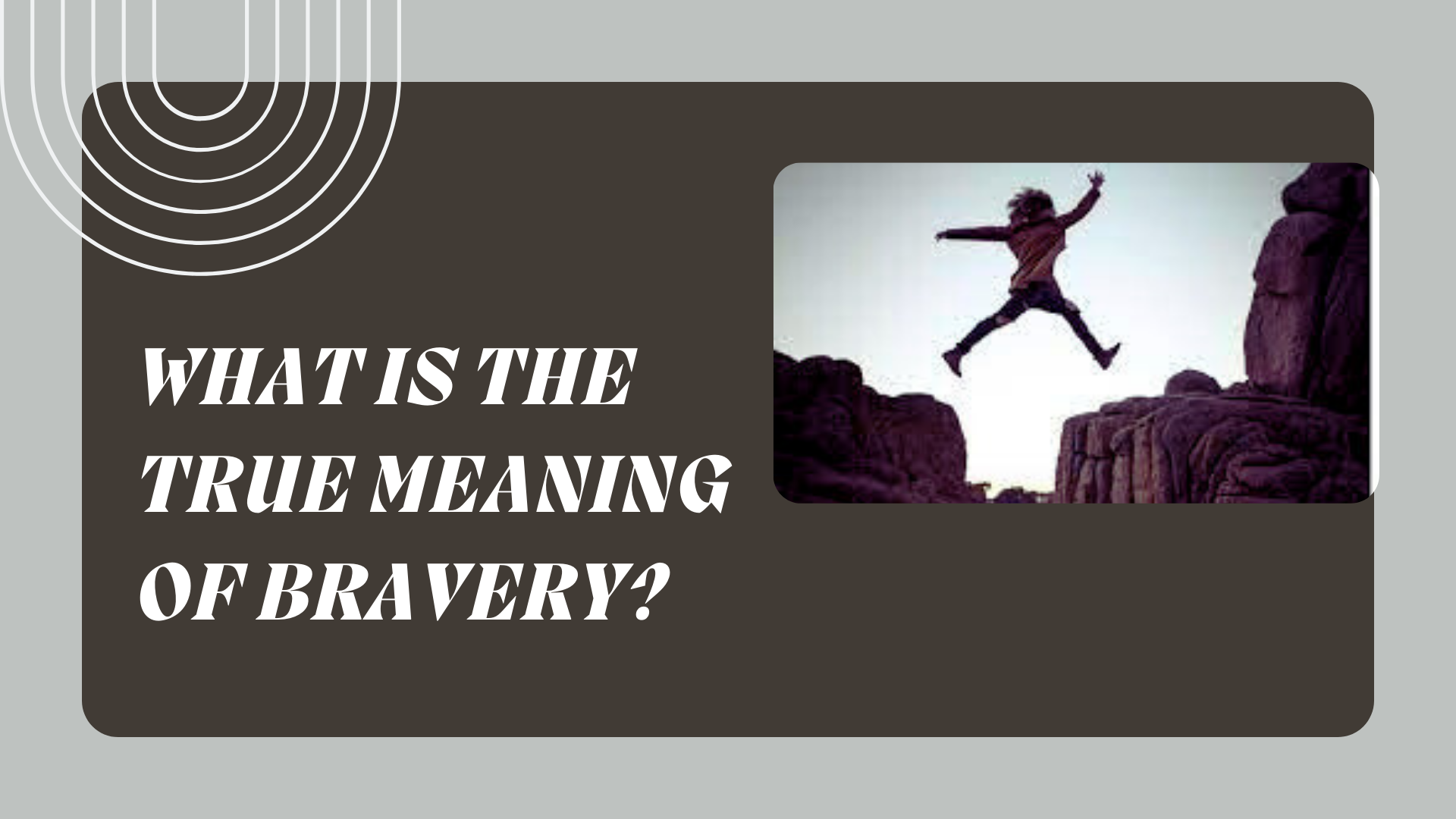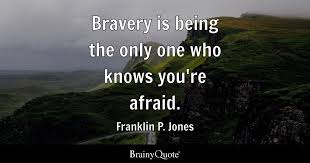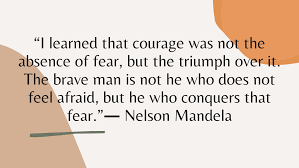What is the true meaning of bravery?
We explain the ”What is the true meaning of bravery?” as,
The true meaning of Bravery is a quality or attribute that refers to the courage, strength, and willingness to face and overcome fear, danger, or difficulty. It is the capacity to face difficult or dangerous circumstances without running away or giving in to fear.
Bravery is often associated with acts of heroism or valor, but it can also be displayed in everyday situations that require courage and resilience. It involves taking risks, standing up for what is right, and remaining steadfast in the face of adversity.
Bravery is the capacity to act despite fear rather than the absence of dread. It requires a sense of determination, self-confidence, and a belief in one’s abilities. Bravery can manifest in various forms, such as physical courage, moral courage, emotional courage, or intellectual courage.
Bravery may act as a catalyst for change and an inspiration to others.
People who demonstrate bravery often exhibit selflessness, sacrifice, and a commitment to their values or a greater cause. Even when it is not the favoured or most convenient course to pursue, they are prepared to stand up for what they believe in, face obstacles, and make difficult choices.
In this regard, bravery includes the strength, fortitude, and will to confront and conquer fear, hardship, or challenging circumstances.
It involves taking action and standing up for what is right, even in the face of danger or uncertainty.
2 example of an incident of bravery
In a small coastal town, there was a sudden and violent storm that caused massive waves and threatened to flood the town. The wind howled, and rain lashed against windows and rooftops. People were scrambling to find shelter and safety.
Amidst the chaos, a young woman named Sarah noticed an elderly couple struggling to escape their rapidly flooding home. She acted without pausing to think first. Sarah, who was known for her athleticism and swimming skills, realized that she was the only one who could reach the couple in time.
With sheer determination and courage, Sarah battled against the fierce waves, fighting her way towards the couple’s house. The water was rising rapidly, and time was running out. She reached the front door, which was jammed due to the pressure from the water. Undeterred, Sarah summoned all her strength and managed to force it open, narrowly avoiding being swept away.
She entered and discovered the pair holding frantically to a piece of floating furniture. The elderly man had injured his leg, making it difficult for him to move. Sarah quickly assessed the situation and devised a plan. Using her swimming skills, she tied a rope around herself and instructed the couple to hold onto it tightly.
With the rope securing them, Sarah started to swim against the strong current, pulling the couple behind her. It was an arduous task, as the waves crashed around them and threatened to separate them at any moment. But Sarah’s determination and bravery never wavered.
Finally, after what felt like an eternity, Sarah managed to guide the couple to safety. Exhausted but relieved, she watched as the rescue team arrived to help them all to higher ground. Her selfless act had saved the lives of two vulnerable individuals in the face of a terrifying storm.
News of Sarah’s incredible bravery spread throughout the town, inspiring others and reminding them of the power of courage and compassion. Sarah’s acts were praised by the neighbourhood, and she became a representation of determination and bravery.
This incident of bravery serves as a testament to the extraordinary courage that can be found within ordinary individuals, willing to risk their own safety to help others in times of crisis.
Incident of bravery in Islamic history
One notable incident of bravery in Islamic history is the Battle of Badr, which took place in the year 624 CE. This battle is considered a significant event in the early history of Islam and showcased the courage and bravery of the Muslim companions of Prophet Muhammad.
The Battle of Badr occurred when a small Muslim army, consisting of approximately 313 poorly equipped soldiers, faced a much larger and well-armed force of around 1,000 soldiers from the Quraysh tribe in Mecca. Despite being outnumbered and lacking in resources, the Muslims displayed immense bravery and unwavering faith in the face of adversity.
During the battle, several Muslim warriors demonstrated exceptional acts of bravery. One notable example is the companion Hamza ibn Abdul-Muttalib, who was known for his physical strength and bravery. Hamza engaged in combat fearlessly and played a crucial role in boosting the morale of the Muslim soldiers. His valorous actions on the battlefield inspired and motivated others to fight with great determination.
Another example of bravery is seen in the person of Ali ibn Abi Talib, the cousin and son-in-law of Prophet Muhammad. Ali’s remarkable courage was evident as he fearlessly confronted some of the strongest opponents on the enemy side, including their renowned warriors. His outstanding skills and bravery were recognized even by the enemy combatants.
The Battle of Badr resulted in a decisive victory for the Muslims, despite the overwhelming odds against them. This triumph had a significant impact on the early development of Islam, boosting the confidence of the Muslim community and establishing their presence in the region.
The Battle of Badr stands as a remarkable incident of bravery in Islamic history, showcasing the unwavering courage and faith of the Muslim soldiers who faced adversity with determination and emerged victorious. It serves as an inspiration to Muslims around the world, reminding them of the importance of bravery, resilience, and steadfastness in the face of challenges.
Bravery is an essential human quality that plays a significant role in personal growth, societal progress, and overcoming challenges. It is the ability to face fear, danger, or uncertainty with courage, resilience, and determination. Here are some main argumentation on why bravery is important to consider:
- Overcoming obstacles: Bravery enables individuals to confront and overcome various obstacles and adversities in their lives. Whether it’s pursuing a new career path, standing up for one’s beliefs, or facing personal fears, bravery provides the strength and motivation to take action and push through difficulties.
- Personal growth and development: Bravery often involves stepping out of one’s comfort zone and embracing new experiences and opportunities. By embracing challenges and taking calculated risks, individuals can expand their horizons, develop new skills, and achieve personal growth.
- Leadership and innovation: Bravery is closely associated with leadership qualities. Leaders need to make tough decisions, take risks, and inspire others to follow suit. By demonstrating courage and conviction, leaders can motivate their team members and drive positive change within organizations and communities.
- Resilience and perseverance: Bravery empowers individuals to bounce back from setbacks and failures. It fosters resilience and helps people maintain a positive mindset even in the face of adversity. Bravery enables individuals to pick themselves up, learn from their experiences, and continue striving towards their goals.
- Positive social change: History is filled with examples of brave individuals who have made a significant impact on society. People like Rosa Parks, Mahatma Gandhi, and Martin Luther King Jr. demonstrated immense bravery in standing up against injustice and fighting for equality. Their courage inspired others and led to transformative social change.
- Overcoming fear and anxiety: Instead of letting one’s worries and concerns to rule one’s life, bravery enables one to face one’s fears and anxieties. By facing and conquering fears, individuals can experience personal liberation, enhanced self-confidence, and increased self-esteem.
- Inspiring others: Acts of bravery have a ripple effect, inspiring and motivating others to take action and make a difference. When people witness acts of bravery, it can spark courage within them and encourage them to face their own challenges.
In summary, bravery is important because it empowers individuals to overcome obstacles, fosters personal growth, drives positive change, and inspires others. By cultivating bravery, individuals can lead fulfilling lives, contribute to their communities, and make a lasting impact on the world around them.
CONCLUSION:
The bravery of life is a concept that encapsulates the courage, resilience, and determination required to navigate the challenges and uncertainties that come our way.
There are many challenges, setbacks, and moments of uncertainty in life, but it is through our bravery that we discover the strength to endure and get through them.
In conclusion, facing our anxieties, taking chances, and moving beyond of our comfort zones are all examples of courage in life.
It is about facing adversity head-on, even when the odds are stacked against us. Bravery is not the absence of fear, but rather the ability to confront and conquer it.
Living a brave life means making bold choices, pursuing our dreams, and standing up for what we believe in, even when it is difficult or unpopular. It is about being true to ourselves and our values, even when faced with criticism or opposition. Bravery enables us to push beyond our limits, discover our inner strength, and unlock our full potential.
Moreover, the bravery of life is not limited to extraordinary acts or grand gestures. It may be discovered in the simple, ordinary moments when we decide to be open and honest with ourselves and others. It is in these moments that we demonstrate our courage and inspire those around us.
Ultimately, the bravery of life is a journey. It is an ongoing process of self-discovery, growth, and personal development. It requires us to continually push ourselves, learn from our experiences, and adapt to new circumstances. By embracing the bravery of life, we can create a fulfilling and meaningful existence, one where we can truly flourish and make a positive impact on the world around us.
FAQ:
What is the true meaning of bravery?
The true meaning of bravery is the ability to face and overcome fear, danger, or adversity with courage and determination. It is about displaying strength and resilience in the face of difficult or challenging situations, often involving risks or uncertainties. Bravery is not the absence of fear but rather the willingness to confront and push through fear in order to do what is right or necessary.
Bravery can manifest in various forms and contexts, whether it’s standing up for one’s beliefs and principles, defending others from harm, taking risks to pursue personal goals, or facing personal struggles and hardships. It involves acting in the face of fear or discomfort, even when the outcome is uncertain or potentially negative.
However, it is important to note that bravery is not synonymous with recklessness. Bravery involves a conscious evaluation of risks and making informed decisions while still mustering the courage to take action. It requires a balance between acknowledging fear and taking calculated steps to overcome it.
Ultimately, the true meaning of bravery lies in the demonstration of inner strength, resilience, and determination in the face of adversity or challenging circumstances. It is a virtue that inspires and motivates individuals to act courageously, making a positive impact on their own lives and the lives of others.
Is bravery and courage the same thing?
Bravery and courage are related concepts, but they are not exactly the same thing. Although facing and conquering fear or danger is a requirement for both bravery and courage, there are notable differences between the two.
Bravery generally refers to the act of exhibiting courage in the face of danger or adversity. It is the quality of being willing to confront fear, pain, or risk. Bravery often implies a physical or external aspect, such as facing a dangerous situation or taking risks to protect oneself or others.
Courage, on the other hand, is a broader and more encompassing term. It includes bravery but goes beyond it. Courage is the ability to act in accordance with one’s beliefs, values, or convictions, even in the absence of fear or in the face of potential social, emotional, or moral risks. It involves taking a principled stand, speaking out against injustice, or pursuing one’s goals despite obstacles or opposition.
In summary, bravery tends to focus more on physical acts of facing danger, while courage encompasses a wider range of situations that involve acting in alignment with personal values or convictions.
Is bravery a character trait?
Yes, bravery is considered a character trait. Being brave, courageous, or fearless in the face of struggle, danger, or misfortune is referred to as a trait or characteristic. Bravery involves the ability to confront challenging situations, take risks, and act in a courageous manner. It often entails overcoming one’s fears or exhibiting resilience in the face of adversity. Bravery is generally admired and valued in individuals, as it demonstrates strength of character and a willingness to face challenges head-on.
What are the values of bravery?
Many civilizations and communities hold bravery in high esteem as a trait or virtue. While the specific values associated with bravery may vary slightly depending on cultural and individual perspectives, there are some commonly recognized values that are often associated with bravery. Here are a few values commonly associated with bravery:
- Courage: Courage is at the core of bravery. It involves facing and overcoming fear, taking action in the face of danger or adversity, and demonstrating resilience and determination.
- Integrity: Bravery often involves standing up for what is right, even when it is difficult or unpopular. It requires a strong sense of integrity, sticking to one’s principles and moral values, and doing what is ethical and just.
- Selflessness: Bravery can also involve acts of selflessness and putting the needs of others before one’s own. It may entail acts of sacrifice, helping others in need, or standing up for the vulnerable or oppressed.
- Perseverance: Bravery often requires perseverance and the ability to endure challenging circumstances. It entails keeping going after one’s objectives or principles in the face of challenges, disappointments, or setbacks.
- Empathy: Bravery can be rooted in empathy and compassion for others. Understanding the struggles and suffering of others and taking action to alleviate their pain or injustice requires a brave and empathetic mindset.
- Responsibility: Bravery also entails taking responsibility for one’s actions and the consequences that may arise from them. It involves being accountable and owning up to mistakes or shortcomings while actively working to make amends or improve.
- Open-mindedness: Bravery can be linked to open-mindedness and a willingness to challenge one’s own beliefs or biases. It involves being receptive to new ideas, perspectives, and experiences, and being willing to learn and grow.
- Leadership: Bravery often involves taking a leadership role, guiding and inspiring others by example. Leading with courage, integrity, and compassion can inspire others to act bravely and make a positive difference.
It’s important to note that bravery is a complex and multifaceted concept, and different individuals or cultures may prioritize or emphasize certain values over others.


